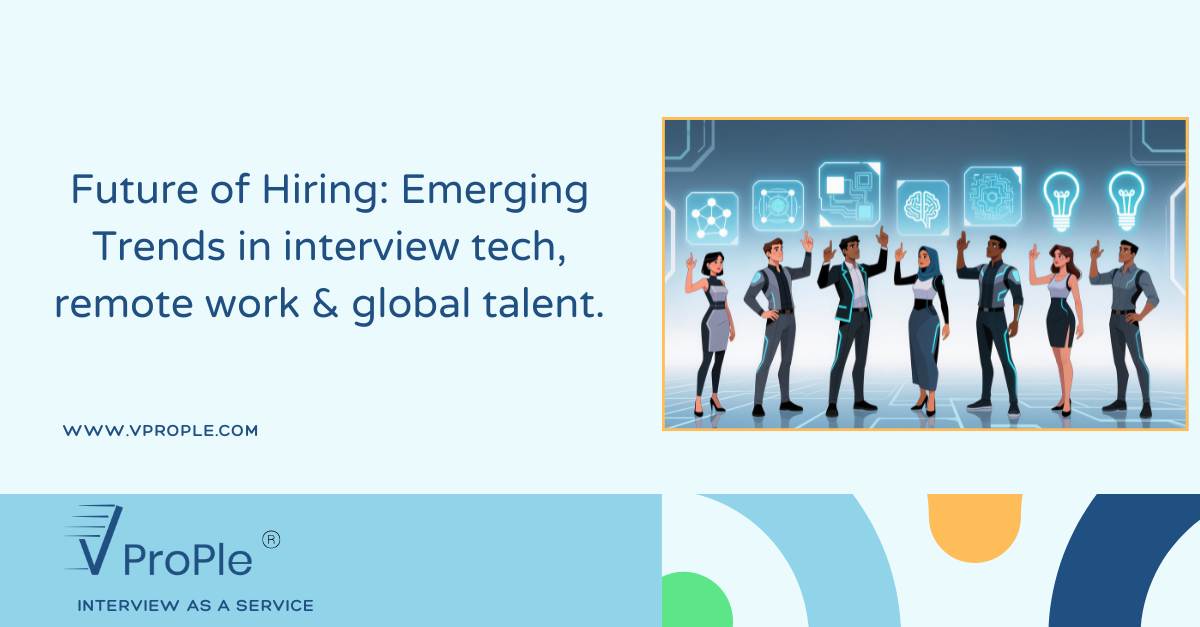This website use cookies to help you have a superior and more relevant browsing experience on the website.
Future of Hiring: Emerging trends in interview tech, remote work & global talent
-
15/11/2025

-By Lalitha Varshini
Future of Hiring: “How to build a skills-first global talent acquisition strategy for remote teams in 2025”, that’s the question many HR leaders are asking today. The hiring landscape is shifting faster than ever. With technology transforming every step of the recruitment process, remote work reshaping talent pools, and businesses competing globally for the best minds, the future of hiring is being rewritten in real time. Companies that once relied on in-person interviews and geographic proximity now operate in a world where AI shortlists candidates, and interviews happen independently of each other.
Future of Hiring: AI hiring in 2025 and evolving HR tech innovations
The age of global talent acquisition has arrived, and it’s powered by automation, analytics, and agility. This blog explores the biggest trends shaping the future of hiring, from the rise of AI hiring in 2025 and evolving HR tech innovations, to how remote work is changing the very definition of what a workplace means today.
Gone are the times when all the team members were expected to be present in a room to conduct meetings or discuss matters. Gone are the times when it was mandatory for employees to stay geographically connected to their colleagues for smooth functioning. In today’s contemporary market, the team lead could be from one part of the world while all the team members operate from around the globe.
What “recruitment” is about?
According to a 2024 report by McKinsey, only 23% of companies say they’ve reached “AI maturity”, despite nearly 65% using AI tools in at least one business function, recruitment being among the top three. (Source: McKinsey State of AI 2024 Report). Recruitment has always been about people. But now, it’s equally about precision, speed, and fairness. As the volume of applicants grows and business demands evolve, organisations can no longer afford slow, biased, or inconsistent hiring systems. Three major forces are redefining recruitment today:
- Technology-Driven Efficiency: Advanced AI tools streamline sourcing, screening, and interviewing, allowing recruiters to focus on strategic human connections rather than repetitive administrative work.
- Remote Work Revolution: The normalization of hybrid and fully remote setups means that location is no longer a limitation but that also means more competition for top talent.
- Skills Over Degrees: The focus is shifting from educational pedigree to demonstrated competence. Employers are seeking evidence of capability rather than just credentials.
Resume or Skills?
For decades, resumes and degrees ruled the hiring game. But as technology democratizes learning and work becomes more specialised, employers are realising that skills weigh heavier than their titles. Skills-first hiring involves:-
- Competency mapping: Defining the core technical and behavioral skills needed for success in each role.
- Task-based assessments: Evaluating candidates through short assignments, simulations, or coding tests instead of long interviews.
- AI-powered screening: Matching candidate skills to job requirements using natural language processing and data-driven models.
This shift benefits global talent acquisition by opening doors to candidates from non-traditional backgrounds and different geographies. Apart from reducing bias, this model helps to pool in diverse talent. Such a model not only contributes to building employer brand image but also maintains an inclusive work environment that doesn’t compromise on talent.
Further Reads: How AI is Transforming HR Processes
Modern day interview innovations
The modern interview is unrecognisable from what it was even five years ago. Today’s HR tech innovations enable structured, data-backed conversations that reduce bias and improve candidate experience. Here’s what’s trending in interview technology:
- Asynchronous Video Interviews: Candidates record answers to preset questions at their convenience. Recruiters then review these using AI-generated summaries and competency tagging.
- AI-Assisted Note-Taking: Real-time transcription and analysis tools help interviewers stay present instead of juggling note-taking.
- Behavioural Analytics: Algorithms can now analyse language patterns and communication cues (ethically and transparently) to assess fit.
- Interactive Job Simulations: For technical and customer-facing roles, candidates are asked to solve real tasks in virtual environments
Blending human expertise with intelligent AI assistants in recruiting.
The hype around artificial intelligence in HR has been intense, but this era marks a new phase. A phase that emphasizes practicality over everything else. AI in hiring in 2025 is no longer about futuristic chatbots or gimmicky resume scans. Instead, it is about integrating intelligent assistants with human recruiters. This could include:-
- Identifying top candidates faster through predictive algorithms
- Analysing job descriptions for inclusive and bias-free language
- Automating interview scheduling and reminders
- Providing data-backed recommendations to hiring panels
Moving beyond mere digitization
Transparent communication with candidates about AI involvement, bias audits, and human oversight has now become non-negotiable. If the past five years were about digitizing HR, the next five will be about intelligently connecting those digital systems. The latest HR tech innovations are converging around five core themes:
- Talent Intelligence Platforms: Combining internal HR data with external labor market insights to guide hiring and workforce planning.
- AI-Assisted Interviewing Suites: Offering live coaching, automated scoring, and candidate comparison tools to ensure consistency.
- Task-Based Assessments: Realistic challenges that measure actual job performance, making hiring fairer and more inclusive.
- Automated Onboarding: Seamless systems that handle documentation, training, and culture integration for remote employees.
- Workforce Forecasting Tools: Predicting future skill needs, attrition risks, and recruitment costs to inform long-term strategy.
Further Reads: Virtual Interviews vs. Traditional Interviews
So what should the HR leaders do today? There are various steps that firms can take to ensure that their workforce is ready for the future. The steps include:-
- Conduct a Skills Audit: The firms must identify the top competencies driving success in key roles and design hiring rubrics around them.
- Pilot AI in Low-Risk Areas: It is crucial to start with scheduling, candidate FAQs, or resume parsing before expanding to interviews.
- Train Interviewers for the Future: Technology helps, but interviewer calibration and structured questions still matter most.
- Create a Global Hiring Operations Unit: Handle compliance, payroll, and remote onboarding from one centralized team.
- Build Ethical AI Governance: Document how AI tools are used, test for bias, and communicate openly with candidates.
- Measure Candidate Experience: Track metrics like application completion rate, interview turnaround time, and new-hire performance.
Read our latest blog: Hidden Costs of Unstructured Interviews.
By focusing on these actions, organizations can future-proof their recruitment processes and build resilience against talent shortages. In the future, the hiring process will look nothing like it does today. The convergence of AI hiring in today’s world, HR tech innovations, and global workforce models will create an ecosystem that’s more data-driven, equitable, and agile. The job market can expect to see:
- AI is deeply integrated into every stage of hiring, right from sourcing to onboarding.
- Standardised skills taxonomies, allowing easier cross-border talent mobility.
- Remote-first companies outpacing traditional ones in time-to-hire and retention.
- Ethical hiring frameworks are becoming a board-level priority.
To conclude, whether it is an HR leader, recruiter, or job seeker, understanding the current shifts is crucial. The companies that adapt to global talent acquisition dynamics, embrace AI hiring in 2025, and invest wisely in HR tech innovations will not just fill roles faster; they’ll build workforces that are smarter, happier, and ready for the next decade of change.


